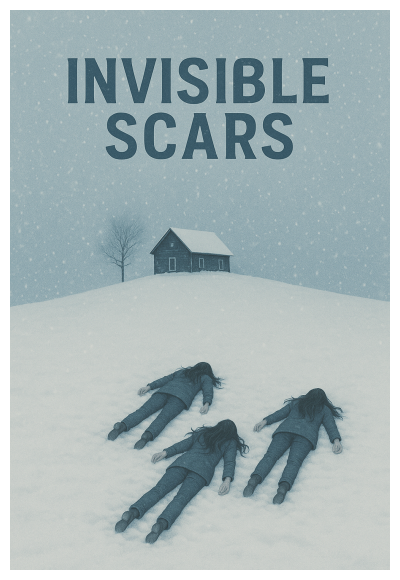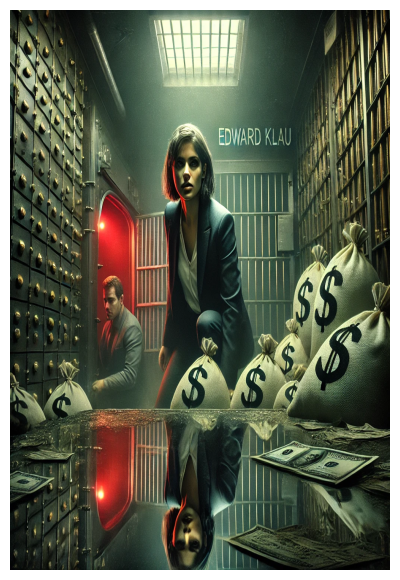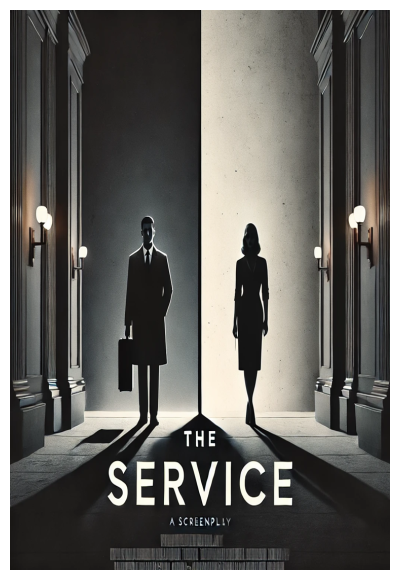Synopsis/Details
In 1975, three very different prisoners—each trapped in their own private hell—receive a mysterious envelope containing a heart-shaped charm and an ominous note: “Go to sleep with this charm and you’ll be free.” SPENCER DAVENPORT III, a polished Ivy Leaguer turned infamous serial killer known as the SBK Killer, is serving a life sentence for the brutal murders of 93 women. CAMILLE DARNELL, a young woman with luminous strength, has been held in sexual captivity for over six years. MYRA GREEN, a sharp but haunted woman hiding under the alias “Jennifer,” lives in sterile anonymity in witness protection, having betrayed dangerous criminal associates.
One by one, they each accept the offer and drop dead.
Spencer awakens in an eternal torment. In a surreal, purgatorial courtroom of darkness, he’s strapped to a chair as each of his 93 victims takes turns violently mutilating him in a grotesque, never-ending cycle of pain. For Camille, death is liberating: she resurfaces in a paradise-like afterlife—a lake surrounded by radiant, kind souls—and is warmly embraced by peace, love, and freedom. Myra, however, finds herself in a Kafkaesque trap: forced to endlessly unpack and restock groceries in a cheerless kitchen, her only meal an endlessly repeating salad. Each is “rewarded” or “punished” according to some cosmic judgment—but none of them are allowed to stay.
All three wake up again, this time in 2025, fifty years later, having been miraculously resurrected. Each finds an envelope with cash, new IDs, and the cryptic instruction: Alcott Motel, Alcott, CA. They converge at the run-down desert motel, confused and terrified. They realize they are all from 1975, all were prisoners, and all now serve a new, unknown purpose.
Waiting for them is a briefcase containing a large knife and another note: Only two can stay. Spin the knife. A brutal moral dilemma unfolds. When Myra tries to walk away, she begins to suffocate. The three are forced to comply with the game. The knife spins—selecting Myra. Camille, who felt genuine kinship with Myra, is devastated. Spencer, although a killer, is equally shaken. But the supernatural rules are clear: if they don’t act, they die. In a moment of rage and inevitability, Camille stabs Myra, who dies, leaving behind a final note hidden in her eye: 1. Don’t tell a soul. 2. Stay together. 3. Have a nice life.
Camille tries to abandon Spencer, only to be magically transported back to her past, re-chained in her kidnapper’s basement. She realizes the note’s rules aren’t suggestions—they are mandates. To break them is to be sent back to hell. Bound by this metaphysical leash, Camille and Spencer are now unwilling partners in a new purgatory disguised as freedom.
As the two navigate the alien world of 2025, Camille resolves to confront her old life. Spencer, wracked by guilt but unsure of his place, follows her. They track down Camille’s kidnapper—DONALD MATTHEWS, who has lived a full life as a police officer, husband, and father after faking Camille’s death. Enraged, Camille murders Donald’s wife and daughter in front of him, savoring his grief. Spencer is horrified, seeing in Camille the same killer he used to be. Camille, however, finds catharsis and power.
The two hatch a plan: transform the Alcott Motel into a secret sanctuary for female abuse survivors. The motel becomes a women’s shelter and trauma support center, fronted by SHERRY, a caring group leader. Spencer and Camille play the roles of reformed siblings, but behind the scenes, Camille begins weaponizing the stories of abuse survivors to identify abusers and exact vengeance.
Spencer wants redemption, to help women heal. Camille wants justice—violent, permanent justice. She uses survivors’ confidential testimonies as hit lists, starting with MICK, an abuser she brutally murders with a wrench. Spencer warns her that they can’t continue killing without drawing suspicion, but Camille is intoxicated by her newfound power.
As their dual lives escalate—one side nurturing, the other lethal—they diverge in motive and morality. Camille, increasingly unstable, seduces and sexually assaults Spencer, chaining him to his bed and asserting control over him. He is reduced to the very thing he once inflicted on his victims: a powerless object.
Meanwhile, Camille’s killings mount. She forces abusive men to write suicide notes that mimic Spencer’s supposed “letter of apology,” masking their murders as acts of guilt-ridden repentance. Spencer, caught in the middle, helps Camille stage the crimes to protect the survivors—especially when one of them, VICKI, learns of her abuser’s death and finds peace.
As more women arrive at the Alcott, Camille asks each for their abuser’s identity and whereabouts under the pretense of protection. Spencer sees the trap: if a pattern emerges, law enforcement will trace the deaths back to the motel. Camille doesn’t care. To her, the motel is a tool of vengeance; to Spencer, it’s a shot at salvation.
The story pushes into deeper psychological territory. Spencer is haunted by flashbacks to his first murders—driven by manipulation from his father and emotional trauma from his stepmother. His descent into murder wasn’t sudden—it was bred by legacy and abuse. Camille, in contrast, morphs from victim to predator, fully stepping into the identity of a cold, calculating killer.
Still, they are tethered to one another—literally and spiritually. If they stray too far, they’re returned to their worst prison. The motel is their battlefield and their limbo.
When Camille targets JORDAN, an abuser about to marry again, Spencer begs her to stop. Instead, she forces Jordan to write a suicide note, slits his wrists in a staged “bathtub confession,” and tapes the note to the mirror. She’s perfected the art of vengeance disguised as atonement. But her pleasure in the kill is unmistakable. Spencer, now openly sickened, sees that Camille has become more monstrous than she realizes—or possibly ever was.
The final scenes hint at their entrapment more deeply. Camille continues manipulating the survivors while chaining Spencer at night and mocking his protests. One night, she asks again about his first kill, taunting him. He refuses. She rapes him again.
Meanwhile, survivors in group therapy unknowingly read Camille’s staged suicide notes aloud, expressing relief or bitterness. The violence that empowers Camille seems to deliver genuine healing for the survivors—revealing a horrifying paradox: Camille may be a monster, but her killings are creating safety. Or at least the illusion of it.
In the final beat, new survivor GG arrives, escaping her abusive husband Bodhi. Spencer meets her with quiet compassion. When she asks if he and Camille are survivors, he lies: “Yeah, from our father.”
GG begins to open up about her son, her abuse, and her guilt. It’s a moment of rare sincerity, and Spencer is clearly moved. GG is one of the few characters who might actually offer him hope. Yet the shadow of Camille looms behind them, as dangerous and radiant as ever.
Camille’s vendetta grows bolder. Spencer’s morality is crumbling. And the motel—once a haven—now risks becoming a slaughterhouse. But until the next envelope arrives, they must stay together.
Story & Logistics
Story Type:
Revenge
Story Situation:
Crime pursued by vengeance
Story Conclusion:
Tragic
Linear Structure:
Linear
Moral Affections:
Punishment
Cast Size:
Few
Locations:
Few
Special Effects:
Minor cgi
Characters
Lead Role Ages:
Female Adult, Male Adult
Hero Type:
Anti-Hero
Villian Type:
Supernatural
Advanced
Subgenre:
Reincarnation
Equality & Diversity:
Female Protagonist
Time Period:
Contemporary times
Country:
United States of America (USA)








